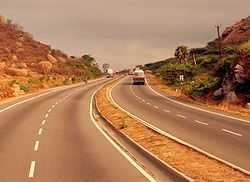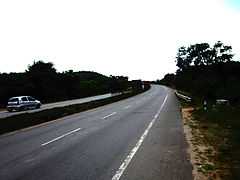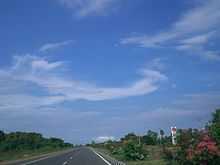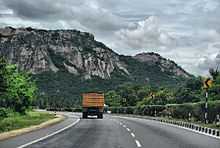Golden Quadrilateral
| Golden Quadrilateral | |
|---|---|
|
Highway map of India with the Golden Quadrilateral highlighted in solid blue colour | |
| Route information | |
| Maintained by NHAI | |
| Length: | 5,846 km (3,633 mi) |
| Delhi – Kolkata | |
| Length: | 1,453 km (903 mi) |
| Major junctions: | NH 2 |
| Delhi – Mumbai | |
| Length: | 1,419 km (882 mi) |
| Major junctions: | NH 8, NH 79A, NH 79, NH 76 |
| Mumbai – Chennai | |
| Length: | 1,290 km (800 mi) |
| Major junctions: | NH 4, NH 7, NH 46 |
| Kolkata – Chennai | |
| Length: | 1,684 km (1,046 mi) |
| Major junctions: | NH 6, NH 60, NH 5 |
| Highway system | |






The Golden Quadrilateral is a highway network connecting many of the major industrial, agricultural and cultural centres of India. A quadrilateral of sorts is formed by connecting Delhi, Mumbai, Kolkata and Chennai, and hence its name. Other cities among the top metropolises namely Pune, Ahmedabad, Jaipur, Kanpur, Surat at north and Bengaluru (mainly connects north-west and minimal parts of south-east regions), Vijayawada, Visakhapatnam & Bhubaneswar at south are also connected by the network.
The largest highway project in India and the fifth longest in the world, started by NDA Government led by then Prime Minister Atal Bihari Vajpayee[1] it is the first phase of the National Highways Development Project (NHDP), and consists of building 5,846 km (3,633 mi) four/six lane express highways at a cost of ![]() 600 billion (US$9.5 billion).[2] The project was launched in 2001 by Atal Bihari Vajpayee under the NDA government, and was planned to complete in January, 2012.[3]
600 billion (US$9.5 billion).[2] The project was launched in 2001 by Atal Bihari Vajpayee under the NDA government, and was planned to complete in January, 2012.[3]
The vast majority of the Golden Quadrilateral (GQ) is not access controlled, although safety features such as guardrails, shoulders, and high-visibility signs are in use.
The GQ project is managed by the National Highways Authority of India (NHAI) under the Ministry of Road, Transport and Highways. Somya]], the first controlled-access toll road to be built in India is a part of the GQ Project though not funded by Nanu, and separate from the main highway. Infrastructure Leasing & Financial Services (IL&FS) has been one of the major contributors to the infrastructural development activity in the GQ project.
History and costs
Then Prime Minister Atal Bihari Vajpayee laid the foundation stone for the project on 6 January 1999.[4]
In January 2012, India announced the four lane GQ highway network as complete.[5][6]
India's government had initially estimated that the Golden Quadrilateral project would cost ![]() 600 billion (US$9.5 billion) at 1999 prices. However, the highway has been built under-budget. As of August 2011, cost incurred by Indian government was about half of initial estimate, at
600 billion (US$9.5 billion) at 1999 prices. However, the highway has been built under-budget. As of August 2011, cost incurred by Indian government was about half of initial estimate, at ![]() 308.58 billion (US$4.9 billion). The eight contracts in progress, as of August 2011, were worth
308.58 billion (US$4.9 billion). The eight contracts in progress, as of August 2011, were worth ![]() 16.34 billion (US$260 million).[7]
16.34 billion (US$260 million).[7]
In September 2009, it was announced that the existing four-laned highways would be converted into six-lane highways.[8] The expansion project was reported at various stages to be behind schedule, mainly due to land acquisition constraints and disputes with contractors which had to be re-negotiated.[9][10]
Sections of NH 2, NH 5 and NH 8 have now been prioritized for further widening to six lanes under DBFO (Design, Build, Finance, Operate) pattern and more sections would be six-laned in the near future. On NH 8 Six lanes work is completed from Vadodara to Surat and now the highway is 6 lanes wide.
The Hosur-Krishnagiri stretch of the Bangalore-Chennai stretch is being expanded from four lanes to six lanes by Reliance Infrastructure.[11]
Economic benefits
The projected economic benefits of the GQ project are -
- Establishing faster transport networks between major cities and ports.
- Providing an impetus to smoother movement of products and people within India.
- Enabling industrial and job development in smaller towns through access to markets.
- Providing opportunities for farmers, through better transportation of produce from the agricultural hinterland to major cities and ports for export, through lesser wastage and spoils.
- Driving economic growth directly, through construction as well as through indirect demand for cement, steel and other construction materials.
- Giving an impetus to Truck transport throughout India.
Route
Only National Highways are used in the Golden Quadrilateral. The four legs use the following National Highways:
- Delhi – Kolkata: NH 2
- Delhi – Mumbai: NH 8 (Delhi – Kishangarh), NH 79A (Ajmer bypass), NH 79 (Nasirabad – Chittaurgarh), NH 76 (Chittaurgarh – Udaipur), NH 8 (Udaipur – Mumbai)
- Mumbai – Chennai: NH 4 (Mumbai – Bangalore), NH 7 (Bangalore – Krishnagiri), NH 46 (Krishnagiri – Walajapet), NH 4 (Walajapet – Chennai)
- Kolkata – Chennai: NH 6 (Kolkata – Kharagpur), NH 60 (Kharagpur – Balasore), NH 5 (Balasore – Chennai)
Important cities connected by Golden Quadrilateral highway
| Delhi – Kolkata | Kolkata – Chennai | Chennai – Mumbai | Mumbai – Delhi |
|---|---|---|---|
|
|
Current status
Govt. of India declares "Golden Quadrilateral" complete - Jan 7th 2012
Length in each state
The completed Golden Quadrilateral will pass through 13 states of India:
- Andhra Pradesh – 1,014 km (630 mi)
- Uttar Pradesh – 756 km (470 mi)
- Rajasthan – 725 km (450 mi)
- Karnataka – 623 km (387 mi)
- Maharashtra – 487 km (303 mi)
- Gujarat – 485 km (301 mi)
- Odisha – 440 km (270 mi)
- West Bengal – 406 km (252 mi)
- Tamil Nadu – 342 km (213 mi)
- Bihar – 204 km (127 mi)
- Jharkhand – 192 km (119 mi)
- Haryana – 152 km (94 mi)
- Delhi – 25 km (16 mi)
- Total – 5,846 km (3,633 mi)
Corruption allegations
In August 2003, Jharkhand-based project director Satyendra Dubey, in a letter to the Prime Minister, outlined a list of malafide actions in a segment of a highway in Bihar. Dubey's claims included that big contractors had inside information from NHAI officials,[12] that the contractors for this stretch were not executing the project themselves (as stipulated in the contract) but subcontracting the work to small builders who lacked technical expertise[12] and that no follow-up was performed after awarding advances.[12] Dubey's name was leaked by the PMO to the NHAI,[12] and he was transferred against his wishes to Gaya, Bihar, where he was murdered on 27 November.[12]
The NHAI eventually admitted that Dubey's charges were substantiated, and implemented "radical reforms" in selection and contract procedures.[13] After a lengthy CBI investigation, Mantu Kumar and three accomplices were arrested and charged with murder. Mantu escaped from court on 19 September 2005,[14] but was recaptured a month later. In 2010, Mantu and two others were convicted of murder and other offenses and sentenced to life in prison.[15]
Progress
In February 2006, a 600 meter stretch of the highway connecting Kolkata to Chennai subsided into the ground, opening up ten meter gorges near Bally, West Bengal.[16] This stretch had been completed a year back by a Malaysian multinational firm, selected after global tendering.
Records
In May 5, 2012, a team of Bhaskar Mandapaka and Prabhakar AVR from Hyderabad circumnavigated the Golden Quadrilateral in 79 hours and 28 minutes, covering 5,968 km.[17]
In 2013, Arnob Gupta and Revanth, also known as the Flying Doctors, traversed the 5996 km long Golden Quadrilateral in 92 hours and 30 minutes on a two wheeler (Honda CBR-250).[18]
See also
- Diamond Quadrilateral
- List of National Highways in India by highway number
- List of National Highways in India
- National Highways Development Project
- North-South and East-West Corridor
- Transport in India
References
- ↑
- ↑ Road network-Source-The National Highways Authority of India (NHAI)
- ↑ Golden Quadrilateral Highway Network. Road Traffic Technology (2011-06-15). Retrieved on 2013-12-06.
- ↑ "Building India's National Pride: The Golden Quadrilateral".
- ↑ "Govt declares Golden Quadrilateral complete". The Indian Express. 7 January 2012.
- ↑ "National Highways Development Project Map". National Highways Institute of India.
- ↑ "Contractors take the sheen off Golden Quadrilateral". The Financial Express. 3 August 2011.
- ↑ Megha Bahree (21 September 2009). "Ambassador: Indian Economy Will Grow". Forbes.
- ↑ "Golden Quadrilateral still has miles to go". Financial Express.
- ↑ R.N. Bhaskar. "Crossing the chasm". Forbes India.
- ↑ "Hosur-Krishnagiri road project goes to R-Infra". New Delhi: The Hindu. 21 May 2010. p. 1. Retrieved 31 March 2012.
- ↑ 12.0 12.1 12.2 12.3 12.4 Bihar govt wakes up to IITian's murder-Source-Rediff News
- ↑ NHAI report to CBI proves Dubey right, contract rules being rewritten-Source-Indian Express
- ↑ Whistleblower in the 2004 National Highway Authority of India case escaped from police custody on Tuesday in Patna-Source-Rediff News
- ↑ Satyendranath Dubey killers get life imprisonment-Source-Oneindia.com
- ↑ GQ: Howrah highway stretch caves in-Source-Indian Express]
- ↑ http://www.motoroids.com/features/motoroids-break-the-limca-record-for-fastest-gq-drive/
- ↑ http://www.motoroids.com/news/new-golden-quadrilateral-record-arnob-gupta-traverses-6000km-in-92-hours-and-30-minutes/
- Fast Lane to the Future, Don Belt. National Geographic, October, 2008.
External links
- 'Mile by Mile, India Paves a Smoother Future' – extremely detailed New York Times article, dated 4 December 2005 (free registration required)
- "Golden Quadrilateral still has miles to go" – Financial Express article dated 26 August 2005
- Official website of the National Highways Authority of India
- Map of GQ progress on the NHAI website
- Ministry of Road Transport


